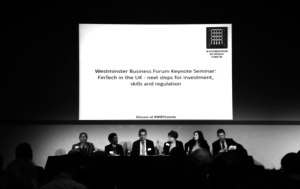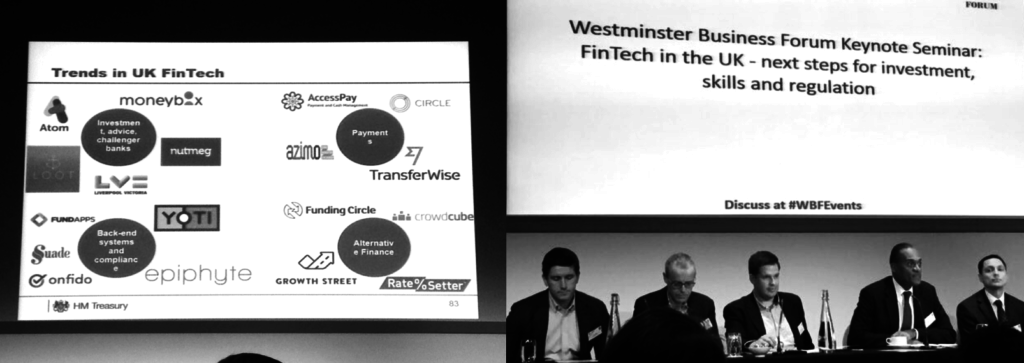 On the 17th January 2017, FinTech & tech strategy expert Stefan Haase represented Whitecap Consulting at the Westminster Business Forum Keynote Seminar: FinTech in the UK – next steps for investment, skills and regulation.
On the 17th January 2017, FinTech & tech strategy expert Stefan Haase represented Whitecap Consulting at the Westminster Business Forum Keynote Seminar: FinTech in the UK – next steps for investment, skills and regulation.
Various interesting topics around the FinTech landscape were discussed – below is the transcript from Stefan’s presentation and input into the Q&A discussion.

“Stefan Haase, Whitecap Consulting; we are a regional strategy consultancy firm who specialise, quite often, in tech and FinTech. And one of the key challenges that we see, from a regional point of view is, in order to attract investment from further afield, especially from abroad, we need a level of certainty what Brexit, hard Brexit, soft Brexit, whatever it may be, actually means. And it’s that level of uncertainty at the moment that actually stops a lot of medium sized business investing in the UK.
We’ve come across companies from Estonia, for example. Estonia, as many of you know lead the world in regards to e-Government, but they’re also very advanced in FinTech. And they’ve actually said, well, at the moment, we’re considering Germany, we’re considering elsewhere, because we don’t know what it actually means for the UK. And from our point of view, that’s something that we need to address quite quickly.
I think we also need to ensure, myself included, what it means to be an EU citizen in this country. You know the gentleman over here just mentioned, you know, a significant proportion of the workforce comes from the EU, and therefore we need to make sure that we tell EU citizen, yes, you’re welcome to stay, you’ve been here for a long time, you’ve paid your taxes, of course we want your skills and input. And that’s, you know it’s sort of a message, I think, needs to come across quite quickly.
But then, moving on, where we see the real opportunity, and we’ve seen quite a lot of movement over the last 12 months, is investing in regional innovation hubs, incubators, accelerators, and professional services hubs. Where young entrepreneurs, people with ideas, even larger corporate organisations, can come into an environment which is more open, which is more flexible, which is more collaborative, where you can actually share ideas. Of course, you’re not necessarily going to work on the same problems, you take ideas back into your organisation, you actually expose yourself to a fresh way of thinking. And we’ve seen lots of larger banks, like Barclays and HSBC, take the lead on that, and actually you know furthering this kind of approach, and I think we need more and more of that. Because above all, the key thing really is, the UK is leading on FinTech.
Now I’ve come from a technology background, I’ve been in the sector for over 20 years, the UK doesn’t lead many technology fields, it really doesn’t. Yes. And most of that comes from across the pond, it always has done. The UK actually leads a technology field, but we don’t really shout about it. It’s a little bit like Formula 1, yes, if you’re in Silverstone, and with a radius of about five/ten miles, you’ll probably see 80/90% of the innovation in Formula 1 in one sector. Do we talk about that? Not really. Again, because in Britain we don’t really shout about the success stories we’ve got.
Here is a real success story, we’ve got to back it. Because we’ve heard earlier in the sessions, that there’s a real threat from the Far East, you know where they’re a lot quicker to invest, and invest heavily, and therefore steal the margin on Britain. I think we’ve got to invest heavily in that area.
But we’ve also seen in the North, we have a headquarter in Leeds, we do a lot of work across Leeds, Manchester, but also other regions, outside of London, there’s a real desire to -actually from London as well, to expand the expertise, the level of skills, and the experience, into other areas. It’s been backed by, for example, the Government Blackett Review which, you know clearly stated, you know London is saturated, is expensive, especially for younger companies to start off a business, to find the right skills, that is affordable, and therefore what can we do in the regions, in Manchester and Leeds, and other places, to actually further this kind of investment.
Whilst Government recently announced FinTech Envoys for the North, one of them Chris Sier, one Claire Braithwaite; Chris is a client of us at the moment, I’m going to come and talk to him about… in a little while. There’s a real drive now from Government, to actually let’s spread the word to other regions, and that, from our point of view, is working quite well. The DIT, the Treasury, is clearly in support of this as well.
We’ve recently had the Lord Mayor of London visiting, you know he’s a gentleman, and his team, who travel the world on a frequent basis, and they wanted to know what’s happening in the North, what’s happening around FinTech. And they took a lot of information away. They didn’t actually realise how much innovation has been delivered over the last few years. So again, there is more momentum now in this area.
The impact of the Financial Centre for Excellence, I think, within the Northern Powerhouse framework and agenda, and also the FinTech Envoys for the north, again, there is now… we’ve started to actually see some tangible experiments, some tangible innovation, actually being delivered. And there’s a lot of talk in lots of forums and meetings, and we’ve seen, you know large tech businesses, large financial service businesses, getting their teeth into tangible experiments, tangible prototypes, tangible projects, because they see there’s demand they see there’s lots of development, and they want to be able to back it. So there’s a real desire now from these larger players, as well as from regional players, to actually back FinTech.
And an example that we’ve seen in the region, is that within Leeds, actually quite unique, we’ve seen all the key players in the region, from local and regional Government, to the Leeds Enterprise Partnership, to companies like Vodafone, companies like HSBC, to Leeds University, who’ve got a mass of experience in regards to big data analytics, for example. Everybody is coming together, and everybody is saying, let’s work on this together, nobody is actually interested in, let’s do it all on our own, they want to work together. And from our point of view, that is quite unique in Leeds.
So one of the projects we’re currently invested quite heavily in is called FiNexus FinTech Lab in Leeds, but all these key players I’ve just mentioned, actually come together to develop prototypes, to give young entrepreneurs a chance to develop new prototypes, new ideas. And all the key players come together, but also it’s a home for some of the larger corporations to have a Sandbox in mind where they can actually play.
You may or may not know from a technical point of view, even the large organisations, they don’t have an environment to play, to try new things, because you’ve got production environments, you’ve got DR environments, you can’t affect those two, you can’t actually try new things, whereas, in these kinds of environments you can actually try new ideas, you can work with some young entrepreneurs on new ideas, on new developments, on fixing a problem; cyber security, for example, within FinTech it’s a massive threat, why don’t you actually find a place to work together, and that’s why the likes of FiNexus Lab in Leeds, can actually deliver that.
And we’ve also seen a lot of demand in regards to all the players saying, look, we’ve got to have a forum to come together and there’s another event starting in April, it’s the second one of the type, FinTech North, it’s called, where we’re expecting 350 attendees from all the regional, and national players, in regards to financial services, in regards to FinTech, but also the wider community come together, and actually further those kinds of projects. And it’s the first of its kind really in the north, and within the Northern Powerhouse, which is why we’ve seen quite a lot of interest from Central Government, to actually make this a success. And from our point of view, there is a huge amount of potential within the north, outside of London, of course. But it’s not seen in competition terms, all we’ve seen are collaboration and coordination. It’s an outlet, not in competition, and that’s the key thing. We want to work together to make sure that, within the UK, we’ve got something that isn’t just London central, but actually spreads across the entire country, and will build in the success that, clearly, has been established in London.
Thank you.”

Q&A Discussion
Adam Afriyie MP:
I think there must be a huge range of questions, because we’ve covered a huge range of topics here. So we now have some time for questions from the floor. If you can say your name, and your organisation when you ask the question, that would be very helpful, so that we can make note of that. So first question please. Yes, at the front.
Tim Reid:
From Four Money, I’m a PR man. A question for Stefan. You talked about the Northern Powerhouse, and it struck me last year, with George Osborne, every time I saw him he was in a hard hat in Leeds, or Manchester, or something. Two things, I suppose, do you think there’s the political will in the new Government, now Osborne has gone, because he really did champion the Northern Powerhouse, to do it? And b, do you think that the north will ever be as mature as London, or is it always going to be playing catch up? Now obviously, with your Leeds base, you would argue, I’m sure, it’s great, etc. But what is the reality, because it strikes me that, okay, London is behind San Francisco, as John said, for example, but London has everything, the infrastructure, the people, the economics, footfall of people, that make it a much more mature and innovative market than Leeds, Sheffield, Manchester, Leicester, where I’m from.
Adam Afriyie MP:
Yes, great question. So Stefan, if you want to start there, if anyone else wants to jump in, do let me know.
Stefan Haase:
Great question. From a Central Government point of view, I think, you could call it willingness, you could call it, they have to do something out of necessity, simply because Brexit is happening. They have to say, no, we’ve got to invest in skills, we’ve got to invest in something that can actually as the gentleman there said, like, you know counter balance some of the possible leakage of skills and businesses abroad. So therefore, what do we do? And from that point of view, you know the strategy for the Northern Powerhouse, for example, and the industrial strategy, I think does clearly support that kind of tendency to become let’s do something, let’s invest in growth markets, invest in innovative things, let’s invest in FinTech because we know what that’s all about, we’ve got a great track record. In regards to will Leeds be as mature as London? I don’t think it’s either a yes or no, it’s a different environment. London, and Leeds, and the north in general, I think, attracts different kind of people. I think the millennial generation, I’ve got four kids, and I see the complete different attitude towards work these days, towards work / life balance. And they say, well, yes, I want to have a great job, but I also want to have a great life. I think they do realise, you know if I want to be able to afford something, it’s going to be a lot more difficult in London. They might actually have much better chances in the north, because it’s easy to commute to work, it’s easy to find a job, and it’s easier to find somewhere to live that’s affordable, so I can still enjoy my leisure time. So therefore, it will attract different people, so I don’t think you can compare, I think they’re both equally mature in their own ways.
Tim Reid:
But is there the will within Central Government with Osborne gone to really push the Northern Powerhouse?
Stefan Haase:
I think the will is there, whether it’s still going to be called the Northern Powerhouse, is debatable. I think the will to invest in the north, from our experience of the last 12 months is definitely there, and I think we’ll see quite a lot of that in 2017.
Adrian Shedden:
From Burges Salmon, though also here with a slightly different hat on, in terms of trying to grow the South West Hub. So Stefan was banging the northern drum, and I think it’s more a comment about the potential need for the FinTech industry, that is largely centred around London, for good reason, to understand that, the future of the UK FinTech industry does rely on developing, you know collaborators in other parts of the UK. And I think, Dan Turnbull is probably going to be speaking about that, a bit later, so I look forward to that.
Adam Afriyie MP:
Thank you very much the input, does anyone want to make any comments or observations?
Stefan Haase:
I think it’s a really good point, you’re absolutely right, it’s not just the north. You are absolutely right, there are other centres in the UK as well, that will develop their own Centres of Excellence, be that in Bristol, be that in Newcastle, be that, you know it’s not just going to be Leeds and Manchester, there are going to be all kinds of hubs, I think, developing around the country, you’re absolutely right, this is just one of those.
Simon Warburton:
A Lawyer from Mills and Reeve. I was just wondering, with the Government funding, whether it should be a bit more like the Olympics, picking particular sectors that we think, yes, that’s where the unicorn may come from. But obviously, there’s thoughts of skills, and things like that, so I was just wondering what the panel thought?
Stefan Haase:
Yes, I think the brilliant thing about the world of technology is, you don’t have to just pick one sector. If you look at things like blockchain and digital ID, whilst they may be funded initially by FinTech, and financial services, there’s obviously an amazing application environment in HealthTech and in GovTech, which, in the end, will help every citizen, will help every taxpayer, will help every patient, to actually make their transaction with the Government, or the health sector, easier, more transparent. They can actually access the data, it’s secure. It will be funded by FinTech initially, but it would be then rolled out across multiple other sectors so therefore, it’s not necessarily supporting a sector, it’s supporting a technology that can then be rolled out across multiple sectors.
(End of transcript)
If you are involved in the fintech sector, you may be interested in attending our event FinTech North on 26th April 2017. The agenda features a number of well-known keynote speakers who will cover topics including innovation, alternative finance, big data and analytics, machine learning, digital identity and authentication. Read more about it here, or alternatively book your place.